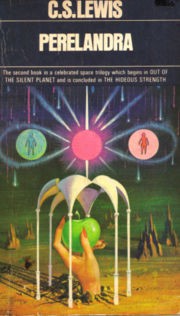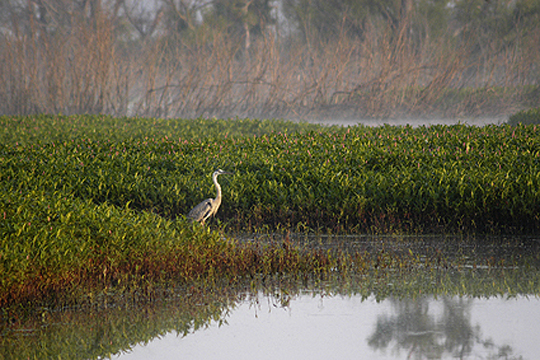Perelandra

It has been a good many years since I read C.S. Lewis’s Perelandra. Recently I reread the first book of this author’s space trilogy, so it seemed natural to attempt a reread of both remaining works as well. Perelandra is Book 2 of the trilogy, and it is the book responsible for reminding me, as a college student, that I loved reading — a reality I had forgotten, somehow.
My rereading got off to a slow start, but once the central action kicked in, I couldn’t put the book down. In this novel the hero of Out of the Silent Planet, Professor Elwin Ransom of Cambridge, is summoned to Perelandra (Venus). The reason becomes clear after he has been there only a short time: the devil, inhabiting the body of the physicist Weston (another figure from the first story), is about to attempt the ruination of Perelandra through a reprisal of his strategy in our world — the temptation of the queen.
Ransom’s journey, and his initial days there, proceed through lots of narrative and description as we get his observations and thoughts about the Perelandrian Paradise, its lush vegetation, its watery surface, its exotic animals and birds, and its glorious (and entirely innocent) green Lady, the only human he meets. She is, when he meets her by swimming from one floating island to another, searching for “the King,” and thus like her biblical counterpart she is alone — a prime target for temptation. But unlike Eve, this Lady is given an advocate and helper in Ransom, who is already in place when evil arrives. In this sense it seems like Lewis approaches the temptation as a wisdom story, in which innocence is essentially naive and, in itself, cannot be expected to withstand an assault by the most cunning of deceivers.
The most captivating part of the story is the section of dialogues between the Lady, Weston (called the Un-man, because he is really not Weston anymore but simply a housing for the evil one), and Ransom. On Perelandra, the one command is not to live on (or spend a night on) the “fixed island,” a territory of stationary ground in a world otherwise filled with floating islands on a warm, delicious sea. The Un-man works for a series of days or weeks with great patience to persuade the Lady to desire the fixed island, to cultivate personal ambition, and to imagine a grand role for herself. On the fixed island, he points out, people do not suddenly become separated, as she has become separated from the King. You can plan on things. You can think about a future for yourself. You can imagine stories and poetry, rather than simply and unthinkingly taking life as it comes in the abundance of Paradise, knowing that all needs are already supplied. He works hard to convince her that “Maleldil” (God) wants her to break the command, and that it will amount to growing up and becoming more beautiful and noble.
Interestingly, Ransom’s attempts to counter the Un-man’s arguments do not succeed. This is one of many important points I thought about as I read. Some battles, it seems, cannot be won through argument. Sooner or later, faced with a superior foe (in this case, superior in the power to deceive and the patience to keep on endlessly arguing), even the truth does not prevail.
The solution, Ransom finally realizes, is not to win the argument, but to destroy the tempter. From there to the end the story undergoes several twists and turns, ending in a philosophical reverie on time and eternity and redemption and the vast, interwoven nature of God’s purposes. Suffice it to say that things turn out better on Perelandra than they did on Thulcandra (Earth — the Silent Planet), though not without the same principles of sacrifice and substitution, enacted in a different way.
I found much to muse on. Several nights while reading this story, I fell asleep trying to imagine an unfallen world in which all needs are met, and the voice of God can be heard over the distracting noise of the self. Maleldil speaks regularly into the Lady and the King (whom we meet, eventually), though we never see him. He speaks to Ransom too, though it takes this earthly man some time and effort to quiet his thought and resistance so that he can hear. “Inner silence is for our race a difficult achievement,” Lewis writes. “There is a chattering part of the mind that continues, until it is corrected, to chatter on even in the holiest places.”
Sin in the story is equated with an unsubmitted imagination — speculative thought — the turning away from what is to what might be. This seems like a startling avenue of evil for a novelist, and it was another thing I found myself — find myself — mulling. It is true that often sin enters through the window of imagination, even of the most idle kind. Something as tame as “This rug needs to be replaced” can become a turning away from the provided and satisfying good to the thing not possessed. Surely this can happen on many levels.
Finally, I was struck by how complete Lewis’s vision is in this story, for the clarity and richness of his Paradise are thrown into sharper focus by the sad picture we get of Weston’s tragic disintegration. The Un-man begins as Weston welcoming the Tempter for his own purposes, but it ends as a hostile spirit that has hijacked his body, the last physical artifact of what was once Weston the great (if misguided) physicist. “There was, no doubt, a confusion of persons in damnation,” Ransom reflects, “What Pantheists falsely hoped of Heaven bad men really received in Hell. They were melted down into their Master, as a lead soldier slips down and loses its shape in the ladle held over the gas ring.” Perelandra is at once a story about a victorious Paradise and a compassionate vision of the fallen.
As I was finishing to book, my family watched the original Star Wars movie — Episode IV, with the original Luke, Leia, and Han. Much though I enjoyed it with its futuristic gadgets, swashbuckling heroes, and vision of a space filled with peopled galaxies, I couldn’t help but reflect on how much more I liked Lewis’s vision of “Deep Heaven” — the dazzling, eternal territory of angels. I found Perelandra to be a rich, sobering, strangely inspiring tale that I hope will continue steeping in my thought life for a long time.




2 Comments
Jeane
I once tried to read this series- in highschool I think- and it baffled me. I could not get past the descriptions of the alien world in the first book, to picture what I was reading about. I wonder now if I’d manage it- does sound quite interesting. I always felt I should read this series just because it was considered a classic, and I was such a fan of his Narnia books when younger.
Janet
My experience in high school was almost identical to yours, Jeane! I reread the first book recently and got through it, but I liked this one much better.